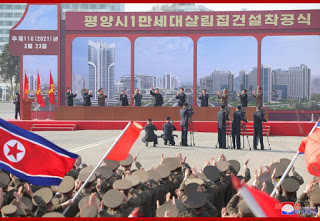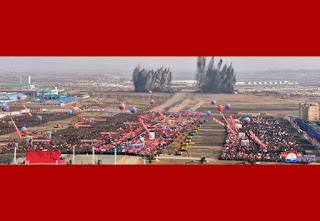On March 23 and 24, the last session of the 46th General Meeting of the UN Human Rights Council, situated in Geneva, was held. The main agenda item was to adopt a “resolution” against the Democratic People’s Republic Korea. The draft “resolution” was jointly proposed by 43 countries including the US, EU, UK, Japan and Australia.
When the West was pitching high their voice of denouncing the DPRK’s “human rights situation,” a groundbreaking ceremony took place on March 23 for the construction of 10 000 flats in Pyongyang, the capital city of the DPRK. These flats, which will be built within this year as part of the project for building 50 000 flats in the capital city during the new five-year plan period, will be provided to its citizens free of charge. And a measure was taken to build 800 characteristic terraced houses on the Pothong riverside independently from the project and make labour innovators and persons of meritorious service in various sectors, scientists, educationalists, writers and other working people presents of these houses.
Is this a mere coincidence of time? Isn’t this an immediate answer to the assertion on the “deteriorating human rights situation in the DPRK” clamoured about by the 43 co-sponsors of the proposal?
In fact, this country builds excellent houses every year at huge state expense and provides them to working people free of charge. Last year, when disastrous typhoons and heavy rainfalls hit various parts of the country, the government had 20 000 modern houses built in a matter of few months by enlisting all its potential, and the flood victims moved to new houses before the approaching winter season, free of charge at that.
In contrast, Japan, one of the co-sponsors, was yet to free 50 000 earthquake victims from nine-year life as refugees as of last year. Worse still, there can be found many homeless people in most of the 43 co-sponsors.
Through the housing issue alone, an important item in ensuring human rights, it is evident that the DPRK is incomparably more advanced than the above-mentioned countries.
Then, what is the purport of the West’s boisterous smear campaign that the human rights situation of the DPRK is “poor”? The answer is clear.
Their real intention is to tarnish its image and isolate it in the international community and justify their schemes to crush it under the mask of “champions of human rights.” Can the schemes be realized? The mere coincidence of the events that occurred nearly at the same time in the western and eastern hemispheres on the earth in late March this year awakened the international community once again


